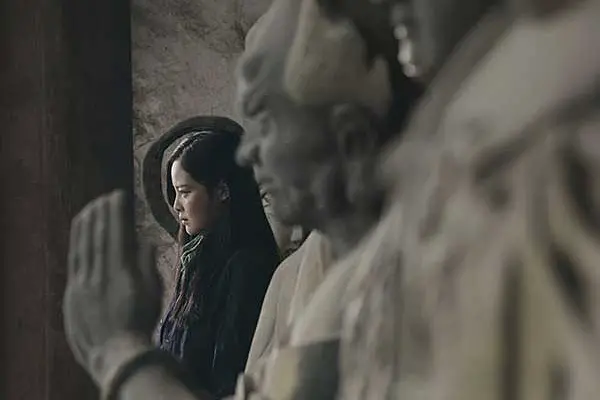(CHINADAILY) Crosscurrent, the Chinese-language movie that won a Silver Bear at the recently concluded Berlin International Film Festival, will hit mainland screens late next month. But box-office success at home is far from guaranteed. Xu Fan reports.
It is a problem Chinese art-house filmmakers have faced for a long time.
Art-house films that do well at prestigious film festivals abroad don't seem to click with domestic audiences despite China being a booming film market.
And Crosscurrent - the Chinese-language movie that won a Silver Bear at the recently concluded Berlin International Film Festival, or Berlinale - may be the latest victim of this syndrome.
The romantic film set on the Yangtze River, which the producers say will open in mainland theaters in late April, won the Outstanding Artistic Contribution to Cinematography award at the 66th Berlin International Film Festival on Feb 20.
Speaking of the film, the 42-year-old art-house director-writer Yang Chao - who tasted success on the international film-festival circuit in 2004, winning the Camera d'Or at Cannes for his feature debut Passages - says: "Western viewers' reactions (to the film) are pretty interesting. Viewers abroad often scream: 'I love every scene of the movie. It's so beautiful. But I don't understand what it (the film) is talking about.'"
But Yang, who spoke to China Daily in his Beijing studio, says their reactions were not unexpected. "Europeans typically watch independent Chinese movies reflecting human struggles and the evolution of society, but those films don't pay much attention to aesthetic aspects.
"So, this film is kind of a surprise for them - seeing a beautiful China."
Speaking of problems faced by art-house filmmakers, Yang, also a movie professor at the National Academy of Chinese Theater Arts, says they have low budgets, which limits them.
Typically, art-house filmmakers work with about 4 million yuan ($610,000) or less.
But Yang raised around 35 million yuan and convinced Taiwan photographer Mark Lee Ping-bin to join him.
Lee, who has partnered with Cannes-winning director Hou Hsiao-hsien for decades, is a luxury most independent directors cannot afford.
Lee, also a past winner of the Berlinale Silver Bear, says it was a cultural connection that prompted him to accept Yang's offer.
He says the Yangtze River is a source of civilization and has inspired numerous poems and literary works in the past 2,000 years.
He adds that following the Yangtze from Shanghai upriver to its headstream in Qinghai province was also a great chance for him to record the beauty of China's longest river.
Interestingly, despite the world's largest film company, Kodak, filing for bankruptcy in New York in 2012 - when Lee shot the film - the veteran cinematographer insisted on using film for the shoot.
Thus, he managed to capture the changes in the river in a way that only films allows, gaining praise from critics who say his images resembled Chinese ink-and-water paintings.
For some diehard movie enthusiasts, Crosscurrent is an elegy to an old era overtaken by the digital revolution.
But the film is also an ode to the Yangtze.
The story centers on a vessel carrying clandestine cargo and its captain's romantic encounters at ports along the Yangtze River.
In the film, each time that the man encounters the same elusive woman, she mysteriously seems to get younger.
Most reviews see the woman as symbolizing the Yangtze or as an incarnation of the river.
The captain's romantic search is seen as the epitome of humans' complex relationship with nature.
The bit about the woman becoming younger is seen as showing how man is getting closer to the source of the river.
"But you'll never get an official explanation from me," says Yang.
"I believe it (speculation about what all these things mean) is the charm of an art-house film. Viewers will draw their own conclusions based on their backgrounds and cultures," he says.
Giving an example, Yang says that some German viewers liken the mysterious woman to sirens, lethal yet beautiful creatures in mythology who lure nearby sailors.
Interestingly, while the crew may not have encountered any mysterious creatures during the film shoot, the film did "lure" some wandering artists, says Yang.
The shoot, which took 63 days, used three boats: a four-floor cruise ship for accommodation, one shattered hull of a boat shown in the movie and another vessel with the cameras.
Artists, singers and poets living in cities along river boarded the cruise ship, and there were cultural discussions with them every night.
"Most of the artists are my friends. We contacted them before the filming. They made the shoot more interesting," says Yang.
Director Wang Xiaoshuai, who won the Berlinale Silver Bear awards twice - in 2001 for Beijing Bike and in 2008 for In Love We Trust - says China's lack of interest in art-house cinema makes this "the worst era for serious movies".
His comments came when his award-winning art-house drama Red Amnesia got just 1.3 percent of screen time last April.
Typically, a highly anticipated commercial tentpole gets at least 30 percent.
Sha Dan, a curator of the Beijing International Film Festival, says that while most European and North American markets have special cinema chains for art-house titles, China has very few such theaters.
For now, Crosscurrent will likely focus more on overseas markets.
Wang Yu, the producer, expects the movie will see around 30 to 40 percent of its box-office receipts come from abroad.
 简体中文
简体中文

